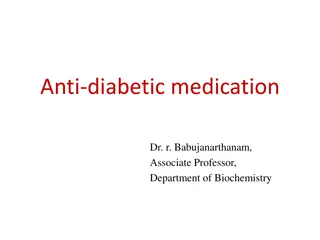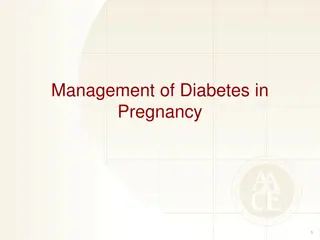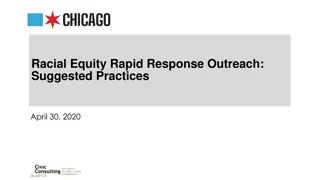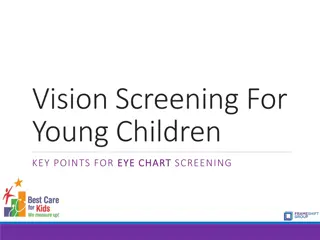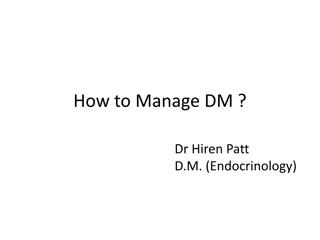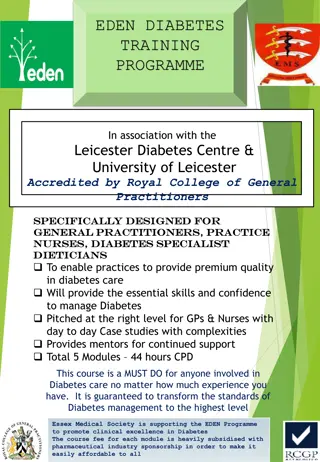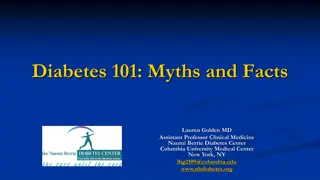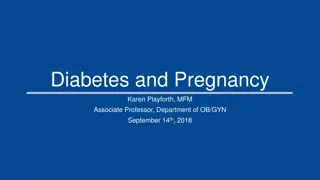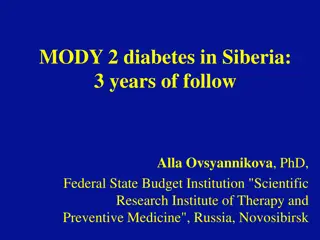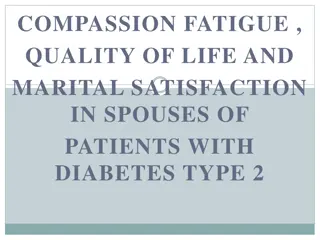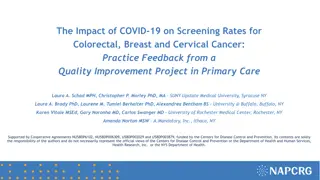Patient Screening and Workflow Process Optimization
The flowcharts and descriptions detail the steps involved in identifying eligible patients for screening, managing patient flow during visits, and tracking screening results. The process includes reviewing patient charts, determining screening eligibility, discussing screening options with patients,
2 views • 5 slides
Understanding Lung Cancer Screening Programs and Criteria
Screening for lung cancer is essential for early detection and intervention. CT scans have shown promise in reducing mortality rates, especially in high-risk populations. While challenges like cost and radiation risk exist, initiatives like the National Lung Screening Trial have demonstrated the eff
4 views • 28 slides
Understanding the Relationship Between Mental Health and Diabetes: Insights for Educators
Exploring the link between mental health issues and diabetes, this presentation by Dr. Mary de Groot discusses the implications for diabetes educators. It delves into the prevalence of mental health conditions in people with diabetes, screening, treatment options, and interrelationships between diab
5 views • 45 slides
Screening for Malnutrition with MUST Tool
Understanding malnutrition is crucial for maintaining optimal health. Screening with the Malnutrition Universal Screening Tool (MUST) is essential to identify individuals at risk. This tool involves assessing BMI, calculating weight loss scores, and determining overall malnutrition risk. Proper scre
5 views • 25 slides
Lower Your Patients' Risk of Type 2 Diabetes with CDC's National DPP Lifestyle Change Program
Lower the risk of type 2 diabetes in your patients by implementing the CDC's National Diabetes Prevention Program (National DPP). This evidence-based lifestyle change program focuses on healthy eating and physical activity, helping participants make lasting changes to prevent or delay type 2 diabete
3 views • 11 slides
Autoimmunity Screening for Kids (ASK) Study Findings in Colorado Population
Autoimmunity Screening for Kids (ASK) conducted a study in Colorado on over 30,000 children aged 1-17, revealing a 1.0% prevalence of pre-symptomatic Type 1 Diabetes (T1D) and a 2.1% prevalence of celiac disease/autoimmunity. The screening showed a significant reduction in Diabetic Ketoacidosis (DKA
1 views • 15 slides
Psychiatric Consultation for Diabetes: Enhancing Care at the Intersection of Mental and Physical Health
This presentation by Dr. James K. Rustad explores the critical role of consultation-liaison psychiatrists in managing diabetes along with mental health conditions like schizophrenia. It delves into the prevalence of diabetes, particularly among specific demographic groups, and highlights the complex
0 views • 35 slides
Senior Wellness Presentation: Managing Diabetes Through Exercise
Explore the benefits of exercise in managing diabetes for seniors, including tips on starting an exercise routine and preventing health issues associated with diabetes. Discover how exercise can improve insulin sensitivity and overall well-being for individuals with Type 2 Diabetes. The presentation
0 views • 14 slides
Overview of Anti-Diabetic Medication and Treatment Options
Anti-diabetic medications are used to treat diabetes by lowering glucose levels in the blood. There are various classes of drugs such as insulin, sensitizers, secretagogues, and more, each targeting different aspects of diabetes management. Type 1 diabetes requires insulin injections, while Type 2 d
0 views • 5 slides
Understanding Diabetes: Types, Causes, and Prevention
Diabetes is a disease that affects how the body uses glucose, the main source of fuel. There are two main types of diabetes – Type 1 and Type 2. In Type 1 diabetes, the pancreas fails to produce insulin, while in Type 2, the body's cells do not respond properly to insulin. Uncontrolled diabetes ca
1 views • 14 slides
Understanding Sanction Regime Framework and Screening Controls
The presented content illustrates the sanction regime framework and screening controls, highlighting the significance of sanctions, who should be screened, and what should be included in the screening process. It covers the scope of sanctions, the importance of sanction screening, tools used for scr
3 views • 42 slides
Comprehensive Guide to Screening and Prevention in Family Medicine
This comprehensive guide explores the definitions, uses, and levels of screening and prevention in family medicine. It covers the criteria for screening tests, types of screening, examples of targeted populations, and approaches to preventing common problems in primary care. The content discusses th
0 views • 73 slides
Managing Diabetes in Pregnancy: Preconception and Post-conception Care
Providing preconception care for women with established type 1 or type 2 diabetes is crucial for ensuring a healthy pregnancy. This involves counseling on effective contraception, evaluating and treating diabetes-related complications, reviewing risks of uncontrolled diabetes during pregnancy, and d
0 views • 37 slides
Understanding Diabetes and Its Management in Students
Diabetes is a chronic condition characterized by high blood sugar levels. This article discusses the management and safety of students with diabetes, highlighting the types and classifications of diabetes, differences between Type 1 and Type 2 diabetes, and the presentations of diabetes. It emphasiz
1 views • 42 slides
Priorities and Quality Measures for Type 2 Diabetes Care in NHS GGC
Dr. Kashif Ali leads primary care for Type 2 diabetes, while Dr. James Boyle oversees secondary care in NHS GGC. The data from December 2018 shows the number of Type 2 diabetes patients, their care processes, HbA1c levels, and BMI status. The Diabetes Quality Improvement and Outcome Measures aim to
0 views • 27 slides
Prostate Cancer Screening Guidelines in Canada: A Snapshot of Strategies
The Canadian Partnership Against Cancer annually collects and summarizes data on national, provincial, and territorial prostate cancer screening guidelines and strategies. Despite the absence of organized screening programs, some provinces have policies in place, with opportunistic screening by prim
0 views • 13 slides
Best Practices for Racial Equity Rapid Response Outreach
This document outlines suggested practices for a racial equity rapid response outreach program, focusing on a workflow for patient outreach, prioritizing patients based on specific criteria, and components of screening including wellness checks and screening for chronic medical conditions. The workf
0 views • 6 slides
Comprehensive Guide to Diabetes Screening in Pregnancy
This comprehensive guide covers the screening, diagnosis, and management of diabetes in pregnancy, including gestational diabetes mellitus (GDM). It includes information on criteria for early prenatal diabetes testing, approaches for diagnosing GDM, and diagnostic criteria for oral glucose tolerance
0 views • 4 slides
Importance of Vision Screening for Young Children
Understanding the critical development of vision in young children is crucial, as vision conditions can go undetected but have significant impacts. Early screening helps in identifying refractive errors, amblyopia, and strabismus for successful treatment. Prevalence statistics highlight the importan
0 views • 23 slides
Integrating Oral Health Screening for Diabetes Risk in Primary Care
This presentation discusses the importance of screening for diabetes risk in oral health care settings through the development of a predictive algorithm to identify high-risk patients. Medical-dental integration is highlighted as a model of care that supports individual and population health by inco
2 views • 16 slides
Implementing Pulse Oximetry Screening for CCHD in Indiana
Indiana implemented pulse oximetry screening for Critical Congenital Heart Disease (CCHD) for all newborns as mandated by state law. The legislation, effective from January 1, 2012, requires every newborn in Indiana to receive CCHD screening, with exceptions only for religious beliefs. The state wor
0 views • 13 slides
Managing Diabetes: Dr. Hiren Patt’s Expert Advice for Mr. Patel
Dr. Hiren Patt, an Endocrinologist, guides a 24-year-old male named Mr. Patel through tests, diagnosis, and management of diabetes. The consultation covers understanding diabetes types, testing procedures, lifestyle changes, ideal weight recommendations, and dispelling myths about curing diabetes. D
0 views • 29 slides
Diabetes Audit 2017/18 Summary for Cambridgeshire and Peterborough CCG
The 2017/18 National Diabetes Audit for Cambridgeshire and Peterborough CCG reveals that 46,695 people are registered with diabetes in the region, with similar profiles to England. The audit shows disparities in diabetes registrations based on age and deprivation levels, and highlights improvements
0 views • 9 slides
Enhancing Cervical Cancer Screening through NHS Cytology Programme
The NHS Cytology Screening Programme aims to reduce incidence and mortality from cervical cancer by offering systematic, efficient screening for pre-malignant diseases. With a history dating back to 1988, the programme targets women aged 25-64, emphasizing the importance of visualizing the cervix an
1 views • 38 slides
Comprehensive Diabetes Training Programme for Healthcare Professionals
This accredited EDEN Diabetes Training Programme, supported by Essex Medical Society, offers essential skills and confidence to manage diabetes effectively. Specifically designed for GPs, nurses, and dieticians, the course covers a range of modules to elevate healthcare providers' ability in diabete
0 views • 4 slides
Comprehensive Overview of Rush Copley Outpatient Diabetes Center
The Rush Copley Outpatient Diabetes Center, led by Donna Carter RN, CDE, offers a rich history of diabetes treatment, from ancient practices to modern advancements. With a focus on patient education and management, the center serves various diabetes types and provides specialized care, including ins
0 views • 18 slides
Screening and Prevention in Family Practice
Definition of screening and prevention in family practice along with the Wilson-Jungner criteria, types of screening tests, and examples like colonoscopy and breast cancer screening. Objectives include understanding screening types and targeted populations, pros and cons of screening, and appropriat
0 views • 33 slides
Understanding Diabetes: Information for School Personnel
Diabetes is a condition where the body struggles to produce or utilize insulin effectively, leading to high blood sugar levels. This guide provides an overview of diabetes, differences between Type 1 and Type 2, managing diabetes, necessary supplies, and the needs of students with diabetes in a scho
0 views • 11 slides
Debunking Common Myths About Diabetes
Diabetes can't be solely attributed to sugar consumption. Genetics and insulin resistance play significant roles. Understanding the criteria for diagnosing diabetes, pre-diabetes, and the importance of the Hemoglobin A1C test are crucial in managing the condition. This article sheds light on prevale
0 views • 18 slides
Meeting the Challenge of Diabetes in China: Prevalence, Trends, and Geographic Variances
This comprehensive study examines the prevalence, trends, and geographic variances of diabetes in China compared to the United States. With a focus on diabetes and prediabetes rates, the analysis spans over two decades, highlighting the significant burden of the disease in the Chinese population. Th
0 views • 24 slides
Understanding Diabetes-Related Liver Diseases and Their Diagnostic Criteria
Explore the various liver diseases associated with diabetes, such as Glycogenic Hepatopathy, Diabetic Hepatosclerosis, and Hepatogenous Diabetes, along with their etiology, diagnosis, and management. Learn about rare conditions like Glycogenic Hepatopathy characterized by glycogen accumulation and h
0 views • 36 slides
Understanding Disease Screening and Prevention in Medicine
Explore the concepts of disease screening and prevention in preventive medicine. Learn about the importance of recognizing preclinical cases, the iceberg phenomenon of disease, and the role of medical intervention in arresting disease progression. Discover when to apply screening, the types of scree
0 views • 36 slides
Diabetes and Pregnancy: Impact, Complications, and Management
This presentation delves into the potential impact of metabolic syndrome and diabetes on women's reproductive health. It covers topics such as preconception counseling for patients with preexisting diabetes mellitus, complications associated with poorly controlled diabetes in pregnancy, baseline eva
0 views • 31 slides
Overview of Cervical Cancer Screening Programs in Canada
The Canadian Partnership Against Cancer conducts an annual environmental scan on cervical cancer screening guidelines and strategies across the country. Organized screening programs are available in most provinces, offering services to asymptomatic women at average risk. This scan provides insights
1 views • 46 slides
Understanding MODY Diabetes: Characteristics and Prevalence in Russia
Maturity-Onset Diabetes of the Young (MODY) is a monogenic form of diabetes that often manifests before the age of 25, with distinct clinical features and modes of inheritance. In Siberia, Russia, MODY prevalence and its various subtypes have been a subject of research, shedding light on its unique
0 views • 32 slides
Understanding Compassion Fatigue in Spouses of Type 2 Diabetes Patients
Compassion fatigue, a common phenomenon among spouses of individuals with type 2 diabetes, can impact quality of life and marital satisfaction. India faces a significant burden of diabetes, with a rising number of cases and high associated costs. The country also experiences an alarming trend of you
0 views • 26 slides
Implementation of Flu-FIT Program for Patient Aligned Care Teams at East Orange VA
This study details the adaptation of the Flu-FIT Program to enhance colorectal cancer screening rates within patient aligned care teams at the Veterans Affairs (VA) Department. By linking influenza immunization with colorectal cancer screening using fecal immunochemical testing, the project aimed to
0 views • 10 slides
Protecting Against Flu: Education for People with Diabetes
Diabetes UK emphasizes the importance of influenza vaccination for individuals with diabetes to reduce the risk of severe complications. In the midst of the unique challenges posed by the 2020 flu season and the ongoing pandemic, efforts were made to increase awareness, encourage early vaccination a
0 views • 13 slides
Impact of COVID-19 on Cancer Screening Rates in Primary Care
This study examines the impact of the COVID-19 pandemic on colorectal, breast, and cervical cancer screening rates in safety-net primary care practices. A 7-year Quality Improvement Project aimed to increase screening rates through tailored education and practice facilitation. The project faced chal
0 views • 5 slides
Insights on Diabetes: Age, Gender, Awareness, and Symptoms
Varied insights on diabetes include age distribution, gender representation, awareness levels, knowledge of diabetes types, personal connections to individuals with diabetes, and familiar symptoms experienced upon diagnosis. The data visualizations provide a comprehensive view of these aspects, shed
0 views • 14 slides








